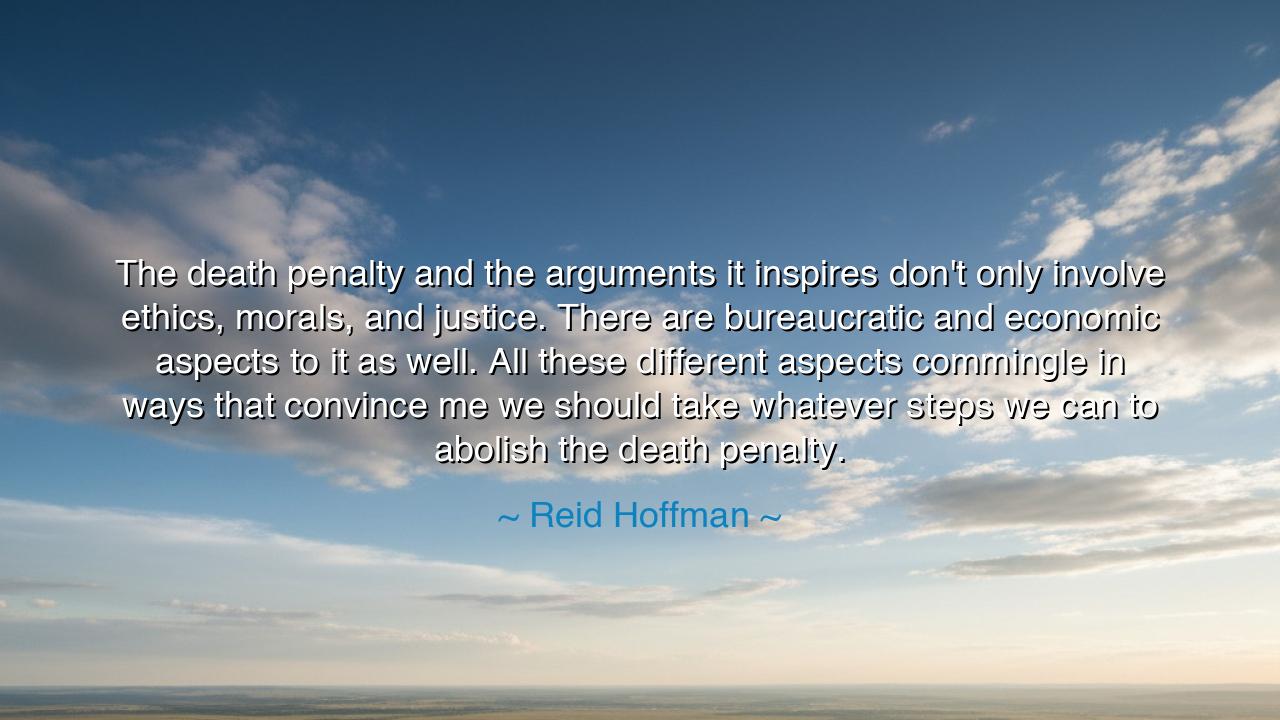
The death penalty and the arguments it inspires don't only
The death penalty and the arguments it inspires don't only involve ethics, morals, and justice. There are bureaucratic and economic aspects to it as well. All these different aspects commingle in ways that convince me we should take whatever steps we can to abolish the death penalty.






The words of Reid Hoffman, when he declared, “The death penalty and the arguments it inspires don't only involve ethics, morals, and justice. There are bureaucratic and economic aspects to it as well. All these different aspects commingle in ways that convince me we should take whatever steps we can to abolish the death penalty,” rise not as a mere political statement, but as a reflection of human conscience refined through the lens of reason. They are the words of one who looks upon the world not only with the heart of compassion, but with the clarity of intellect. In his voice echoes an ancient truth: that justice must never be born of vengeance, and that the measure of civilization is not found in its punishments, but in its mercy.
In the time of the ancients, philosophers and kings alike wrestled with the meaning of justice. The Greeks spoke of Dike, the divine order that governed fairness, while Confucius taught that the strength of a state lies not in its power to punish, but in its ability to cultivate virtue. So too does Hoffman’s reflection remind us that justice is not a single blade, but a web of forces — ethical, moral, bureaucratic, and economic — each influencing the other in unseen ways. He warns that to defend the death penalty as a matter of moral retribution is to ignore the machinery beneath it: the cost, the corruption, the imperfection of men who wield power over life and death.
For the ancients understood that the apparatus of justice is always shaped by human hands — and therefore fallible. The law may claim purity, but those who enforce it are but mortals, bound by prejudice, greed, and pride. Hoffman’s insight cuts deep into this truth: that the death penalty, far from being a symbol of moral clarity, is entangled in systems that are neither pure nor divine. It is not only a question of ethics, but of economics — of who bears the cost, and who profits from it. It is not only a matter of morality, but of bureaucracy — of how the slow turning of legal wheels can grind both guilt and innocence into dust.
History bears witness to this tragedy. Consider Socrates, condemned by his own city not because he was evil, but because he questioned those in power. The state, draped in the robes of justice, served him hemlock in the name of righteousness. Yet in that cup lay not justice, but fear disguised as order. Or think of the countless innocents who perished in ages past — burned as witches, executed as traitors, silenced as heretics — all victims of a system that confused punishment with purity. Even in our modern age, where laws are written with precision, the hand of error has not been stilled. To kill in the name of justice when justice itself is uncertain is to mock the gods.
Hoffman’s wisdom lies in seeing the whole system, not only its moral surface. The death penalty, he reminds us, is not an isolated act of moral decision — it is part of a vast and imperfect structure. The cost of execution often exceeds that of life imprisonment. The bureaucratic delays stretch across decades, entangling victims’ families in endless waiting. The errors of investigation, the biases of juries, the inequities of wealth — all merge into a shadowed current that flows beneath the courtroom floor. Thus, when he calls for abolition, it is not merely from compassion, but from recognition of the flawed machinery of human governance.
To the wise, this insight is a call to humility. For who among men can rightly judge who deserves life or death? The ancients spoke of the Fates — three weavers who alone determined the length of a man’s thread. To assume that power is to take upon oneself the burden of divinity. And when a society assumes the right to extinguish its own members, it becomes less a guardian of order and more a reflection of its own fear. The higher path is mercy — not the weak mercy of indifference, but the strong mercy of understanding that justice must heal, not destroy.
So let the generations who hear these words remember this: Justice is not vengeance. Punishment is not purification. The death penalty is not a symbol of strength, but of failure — the failure to find a better way. The true courage of a society lies in its ability to forgive, to rehabilitate, and to restrain its own rage. Let lawmakers, citizens, and leaders alike look upon the face of this truth and act. Let them choose life over death, compassion over fear, and wisdom over pride.
And the lesson, simple yet eternal, is this: to value every human life, even that of the fallen, is to affirm our own humanity. When we refuse to kill in the name of justice, we declare that our civilization has grown beyond the sword — that we have learned, at last, that the truest justice is not in retribution, but in redemption.






AAdministratorAdministrator
Welcome, honored guests. Please leave a comment, we will respond soon